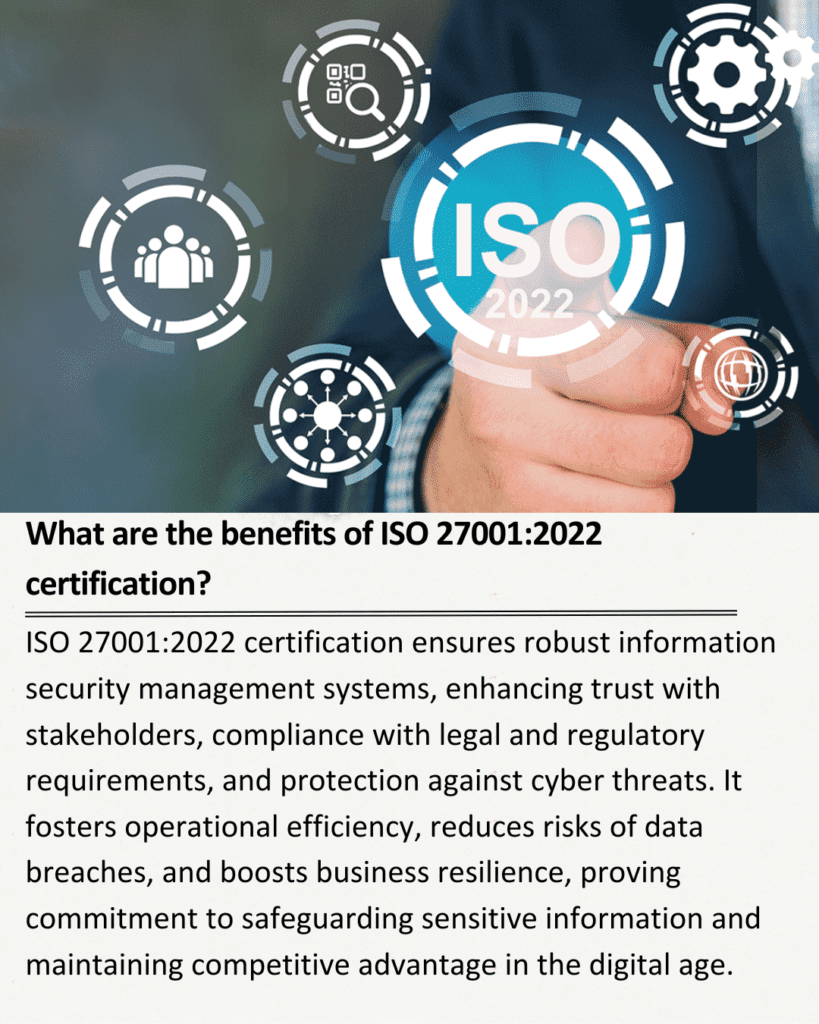Subtotal $0.00

In today’s digital age, where data breaches and cyber threats pose significant risks to businesses, implementing robust information security measures is crucial. ISO 27001:2022, the latest version of the internationally recognized standard for Information Security Management Systems (ISMS), offers a systematic approach to managing sensitive company information, ensuring its confidentiality, integrity, and availability.
1. Enhanced Information Security Management
ISO 27001:2022 provides a framework that enables organizations to establish, implement, maintain, and continually improve an ISMS. By adopting this standard, organizations can systematically identify, assess, and mitigate information security risks. This proactive approach helps in preventing security incidents and data breaches, thereby safeguarding sensitive information.
2. Global Recognition and Compliance
Achieving ISO 27001:2022 certification demonstrates an organization’s commitment to information security best practices recognized globally. It enhances credibility and trust among stakeholders, customers, and business partners who prioritize security when choosing vendors or collaborators. Compliance with ISO 27001 also ensures alignment with legal and regulatory requirements related to data protection and privacy.
3. Competitive Advantage and Market Differentiation
ISO 27001 certification can provide a competitive edge in the marketplace. It signals to potential customers that the organization has implemented stringent security measures to protect their data. In industries where data security is a primary concern, such as finance, healthcare, and IT services, ISO 27001 certification can be a decisive factor in winning contracts and gaining market share.
4. Improved Business Resilience and Continuity
Effective risk management and contingency planning are integral parts of ISO 27001:2022. By identifying and mitigating risks to information security, organizations can enhance their resilience to potential disruptions. This includes not only cyber threats but also other risks that could impact information availability and business operations. Implementing ISO 27001 ensures that critical business functions can continue even in adverse circumstances.
5. Cost Savings and Efficiency Gains
ISO 27001 encourages a systematic approach to managing information security risks, which can lead to cost savings over time. By identifying vulnerabilities early and implementing appropriate controls, organizations can reduce the likelihood and impact of security incidents. This proactive approach minimizes potential financial losses associated with data breaches, regulatory fines, and reputational damage.
6. Enhanced Customer Trust and Satisfaction
ISO 27001 certification demonstrates an organization’s commitment to protecting customer information and respecting privacy concerns. This can enhance customer trust and satisfaction, leading to improved retention rates and positive word-of-mouth referrals. Customers are increasingly aware of the importance of data security, and ISO 27001 certification provides reassurance that their information is handled with care.
7. Continuous Improvement and Adaptation
ISO 27001:2022 emphasizes a culture of continuous improvement in information security practices. Through regular audits, reviews, and updates to the ISMS, organizations can adapt to evolving threats and technological advancements. This proactive approach ensures that security measures remain effective and relevant in addressing new challenges posed by cybersecurity threats, regulatory changes, and business growth.
8. Employee Awareness and Engagement
Implementing ISO 27001 involves educating and engaging employees at all levels about their roles and responsibilities in maintaining information security. This awareness fosters a security-conscious culture where employees are vigilant about potential threats and adhere to security protocols. Engaged employees are more likely to contribute to the success of the ISMS and actively participate in its continual improvement.
Conclusion
ISO 27001:2022 certification offers numerous benefits to organizations seeking to enhance their information security posture. From improved risk management and regulatory compliance to enhanced customer trust and operational efficiency, ISO 27001 certification serves as a strategic investment in safeguarding sensitive information and maintaining business resilience. By adopting ISO 27001, organizations can mitigate risks effectively, capitalize on competitive advantages, and demonstrate their commitment to protecting valuable assets in an increasingly interconnected world.
Implementing ISO 27001 requires dedication, resources, and a commitment to continuous improvement, but the benefits of certification far outweigh the initial investment. As organizations navigate the complexities of information security in the digital era, ISO 27001 provides a robust framework for achieving and maintaining a secure and resilient business environment.